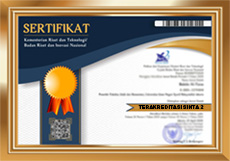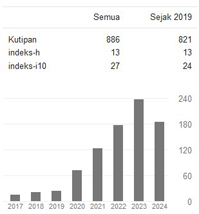Misteri Buah Ara Dalam Retorika Yeremia 24
Abstract
This article aims to present an analysis of Jeremiah 24:1-10, with a focus on the text's structure and rhetoric. This research treats Jeremiah 24:1-10 as a cohesive unit, differing from the views of redactional theorists who commonly consider verse 1b in Jeremiah 24:1-10 as a redactional addition. According to them, reading Jeremiah 24 without verse 1b would not significantly impact the understanding of the passage. Verse 1b, mentioning King Jeconiah, the officials of Judah, the artisans, and the smiths, is added as propaganda reflecting Jeconiah’s claims or legitimization and that of his supporters to live and rule in Jerusalem and Judah. In contrast to this perspective, this article views verse 1b as one of the structural and rhetorical elements that demonstrate how the text is organized. This article will identify structural devices such as keyword repetitions and contrasts that can indicate the rhetoric or persuasive techniques employed in the text. The analysis finds that Jeremiah 24:1-10 contains rhetoric of God's mysterious providence, showcasing God's full authority to change or determine the fate of nations or kingdoms that humans sometimes cannot comprehend.
Key words : rhetoric, providence, mystery, paradox, quality, civilisation
Full Text:
PDFReferences
Alonso-Schökel, A. “Hermeneutical Problems of a Literary Study of the Bible.” 1–15. Brill, 1975.
Anderson, Bernhard W. “Introduction. The New Frontier of Rhetorical Criticism. A Tribute to James Muilenburg.” Dalam Rhetorical Criticism: Essays in Honor of James Muilenburg. Ed. Jared J. Jackson, Martin Kessler, dan James Muilenburg, 9–18. Pittsburgh Theological Monograph Series 1, 1974.
Bovati, Pietro, dan Salvatore Maurizio Sessa. Così Parla Il Signore: Studi Sul Profetismo Biblico. Biblica. Bologna: EDB, 2008.
Brueggemann, Walter. Hope within history. Westminster John Knox Press, 1987.
Carroll, Robert P. Jeremiah: A Commentary. Old Testament Library. Philadelphia: Westminster press, 1986.
Chalmers, Aaron. Interpreting the Prophets: Reading, Understanding and Preaching from the Worlds of the Prophets. Downers Grove, Illinois: IVP Academic, an imprint of InterVarsity Press, 2015.
Elliger, K. Biblia Hebraica Stuttgartensia, Editio Funditus Renovata. New Edition. Stuttgart: Deutche Bibelgesellschaft, 1997.
Eskhult, M. Studies in Verbal Aspects. Stockholm, 1990.
Fischer, Georg. Jeremiah Studies: From Text and Contexts to Theology. 1st edition. Mohr Siebeck, 2020.
Fishbane, Michael A. Text and Texture. Close Readings of Selected Biblical Texts. New York: Schocken Books, 1979.
Freedman, David Noel, ed. The Anchor Bible Dictionary. The Anchor Bible Dictionary 1. New York: Doubleday, c1992 1996.
———, ed. The Anchor Bible Dictionary. The Anchor Bible Dictionary 3. New York: Doubleday, c1992 1996.
———, ed. The Anchor Bible Dictionary. The Anchor Bible Dictionary 5. New York: Doubleday, c1992 1996.
Holladay, William Lee, dan Paul D. Hanson. Jeremiah 1: A Commentary on the Book of the Prophet Jeremiah, Chapters 1-25. Hermeneia-A Critical and Historical Commentary on the Bible. Philadelphia: Fortress Press, 1986.
House, Paul R. “Plot, Prophecy and Jeremiah.” Journal of the Evangelical Theological Society 36.3/4 (1993): 297–297.
Kessler, Martin. “An Introduction to Rhetorical Criticism of the Bible: Prolegomena.” Semitics 7 (1980): 1–27.
Kikawada, Isaac M. “Some Proposals for the Definition of Rhetorical Criticism.” Semitics 5 (1977): 67–91.
LAI, trans. Alkitab Terjemahan Baru (TB). Bible Society, 2008.
Lambdin, Thomas Oden. Introduction to Biblical Hebrew. Repr. London: Darton, Longman and Todd, 1982.
Long, Burke O. “Reports of Visions among the Prophets.” Journal of Biblical Literature 95.3 (1976): 353.
Lundbom, Jack R. Jeremiah 21–36: A New Translation with Introduction and Commentary. 1 ed. Doubleday, 2004.
Marshall, Thomas L. “Biblical Criticism: Rhetorical Criticism.” Christian Publishing House Blog, 25 Mei 2018. Daring. Internet. 13 Sep 2023.
McKane, William. A Critical and Exegetical Commentary on Jeremiah 2: Commentary on Jeremiah XXVI - LII. Edinburgh: Clark, 1996.
———. Introduction and commentary on Jeremiah I -XXV. A critical and exegetical commentary on Jeremiah Vol. 1. Edinburgh: Clark, 1999.
Meynet, Roland. Rhetorical Analysis: An Introduction to Biblical Rhetoric. Sheffield, England: Sheffield Academic Press, 1998.
Muilenburg, James. “Form Criticism and Beyond.” Journal of Biblical Literature 88.1 (1969): 1–18.
Murphy, S Jonathan. “The Quest for the Structure of the Book of Jeremiah.” Bibliotheca sacra 166.663 (2009): 303–318.
Ryken, Leland. How to Read the Bible as Literature. Grand Rapids, Michigan: Zondervan, 2016.
Seitz, Christopher R. Theology in Conflict: Reactions to the Exile in the Book of Jeremiah. Walter de Gruyter GmbH & Co KG, 2014.
Stulman, Louis, dan Edward Silver, ed. The Oxford Handbook of Jeremiah. New York, NY: Oxford University Press, 2021.
Sweeney, Marvin A. Isaiah 1 - 39: With an Introduction to Prophetic Literature. The forms of the Old Testament Literature 16. Grand Rapids, Mich.: Eerdmans, 1996.
Telman, Carole. “On the Structure of the Book of Jeremiah.” Submitted to Dr. Vincent Medina, 24 Apr 2020. Daring. Internet. 19 Sep 2023.
Telman, Carole L. “On the Structure of the Book of Jeremiah” (2020).
Thompson, J. A. The Book of Jeremiah. Wm. B. Eerdmans Publishing, 2022.
Walsh, Jerome T. Style and Structure in Biblical Hebrew Narrative. Liturgical Press, 2001.
Wessels, W. J. “Jeremiah 24: 1-10 as a pronouncemcnt of hope?” Old Testament Essays 4.3 (1991): 397–407.
Wuellner, Wilhelm. “Rhetorical Criticism and its theory in culture-critical perspective: The narrative rhetoric of John 11.” Dalam Text and Interpretation. 171–185. Brill, 1991.
DOI: http://dx.doi.org/10.31385/jl.v23i1.444.59-73
Refbacks
- There are currently no refbacks.

This work is licensed under a Creative Commons Attribution-NonCommercial-ShareAlike 4.0 International License.

Copyright© 2015 JURNAL LEDALERO This work is licensed under a Creative Commons Attribution-NonCommercial-ShareAlike 4.0 International License.
Institut Filsafat dan Teknologi Kreatif Ledalero Jalan Trans Maumere-Ende - Sikka - Flores - Nusa Tenggara Timur - Indonesia Telp/Fax: 0382 2426535










